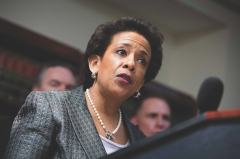 President nominates Loretta Lynch as pick for Attorney General
President nominates Loretta Lynch as pick for Attorney General
By ERIC TUCKER
Associated Press
The 1997 assault on Abner Louima set off street protests, frayed race relations and led to one of the most important federal civil rights cases of the past two decades — with Lynch a key part of the team that prosecuted officers accused in the beating or of covering it up.
President Barack Obama’s nomination of Lynch to be attorney general comes as the department she would take over continues to investigate the police shooting of an unarmed Black 18-year-old in Ferguson, Missouri and seems partly intended to convey the message that police misconduct and civil rights will remain a principal focus even after the departure of Eric Holder.
If confirmed by the Senate, Lynch would be the first Black woman in the job and would follow the first Black attorney general.
Lynch has overseen corruption, terrorism and gang cases in her years as a federal prosecutor. But it’s her involvement some 15 years ago in the Louima prosecution that gave her high-profile experience in step with a core priority of the Justice Department.
“It is certainly significant that she has a personal history of involvement in prosecuting police misconduct,” said Samuel Bagenstos, the former No. 2 official in the department’s civil rights division. “Obviously that will be helpful, and probably suggests that police misconduct cases will continue to be a priority of the Lynch Justice Department just as they were with the Holder Justice Department.
Lawyers say Obama likely selected Lynch, 55, the current U.S. attorney for the Eastern District of New York, on the strength of a varied career and stature within the department.
“She has spent years in the trenches as a prosecutor, aggressively fighting terrorism, financial fraud, cybercrime, all while vigorously defending civil rights,” Obama said in introducing Lynch at the White House ceremony Saturday. He said her prosecution of the officers in the Louima case was “one of her proudest achievements.”
But there’s also no doubt that selecting someone with civil rights experience could reaffirm the government’s commitment to that cause. That figures to be an especially important signal to send as community members in Ferguson brace for the real prospect that state and federal investigations into the shooting death of Michael Brown will close without criminal charges, outcomes that could disillusion civil rights activists and community members.
Holder has said he expects the federal investigation to conclude before he resigns, but Lynch still would inherit a civil rights probe into the practices of the entire Ferguson Police Department.
That investigation is one of roughly 20 that the Justice Department has initiated into troubled police departments in the past five years, more than twice the number undertaken in the five years before that. Those cases are part of a broader civil rights push — including challenging strict state voter identification laws and promoting changes in how federal prosecutors negotiate sentences — likely to help shape Holder’s legacy.
Holder’s supporters expect Lynch to continue that work, though her experience in two different stints as U.S. attorney goes well beyond that.
Her office, which encompasses Brooklyn, Queens, Long Island and Staten Island, won convictions in a thwarted plot to bomb the city’s subway system, successfully prosecuted a New York state assemblyman caught accepting bribes in a sting operation and, more recently, filed tax evasion charges against Republican Rep. Michael Grimm. She’s also worked closely with Justice Department leadership by heading a U.S. attorneys committee that advises Holder on policy.
But it was the case of Louima, tortured with a broken broomstick on a bathroom floor, that elevated her profile. In a Senate questionnaire for the job of U.S. attorney, she placed the case second — behind only a sexual harassment matter involving a city councilman — in a list of the most significant cases she personally handled.
Brooklyn District Attorney Kenneth Thompson, a trial team member, recalled how Lynch generously gave him — a more junior prosecutor — the responsibility of delivering opening statements while she worked to craft the strategy that would be presented to the jury.
During the first trial in 1999, which ended with mixed verdicts, the prosecution team hammered the officers for hiding behind a “blue wall of silence.”
“Don’t let these defendants push us back to the day when police officers could beat people with impunity, and arrest people for no reason and lie about it to cover it up,” she told jurors.
Alan Vinegrad, who succeeded Lynch as U.S. attorney for the Eastern District and worked alongside her on the Louima case, recalled her as a diligent and thorough prosecutor who made a compelling final argument to the jury.
“She had to get up and respond to all the arguments of five different lawyers made over a day about why all their clients were not guilty of anything,” Vinegrad said. “She had to pretty quickly decide, ‘OK, what are the important arguments. How do I respond to them persuasively?'”
Lynch was U.S. attorney from 1999 to 2001, as the Louima case slogged through the courts on appeals and new trials. She left for private practice before being nominated in 2010, this time by Obama, to run the office again.
Lynch, who grew up in Greensboro, North Carolina, “rode on her father’s shoulders to his church, where students would meet to organize anti-segregation boycotts,” Obama said. “She was inspired by stories about her grandfather, a sharecropper in the 1930s, who helped folks in his community who got in trouble with the law and had no recourse under the Jim Crow system.”
The president said Lynch “has spent her life fighting for fair and equal justice that is the foundation of our democracy.”



